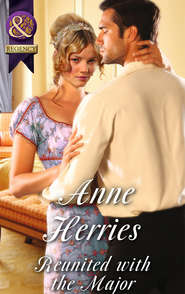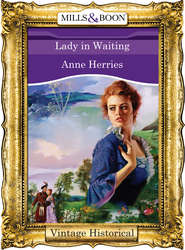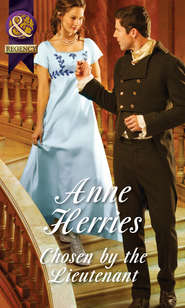По всем вопросам обращайтесь на: info@litportal.ru
(©) 2003-2025.
✖
An Innocent Debutante in Hanover Square
Настройки чтения
Размер шрифта
Высота строк
Поля
‘You will go and you will leave Ned with me,’ she said, her voice strong and fearless despite the knots tying themselves in her stomach as she faced the great brute of a man she had caught beating his climbing boy. ‘You are lucky that I do not call the magistrate and have you arrested for cruelty. This child is too ill to do his work.’
‘Lazy ingrate that’s what he be,’ the sweep muttered. His hands were ingrained with soot, his face streaked with it. He had a fearful scar on one cheek and he squinted with his left eye. He was scowling so fiercely that Helene’s courage might have deserted her had she not seen the scars on a previous climbing-boy’s back. Jeb had died of his injuries. She was determined that it would not happen to Ned. ‘I bought the brat from the workhouse. He belongs to me—and that’s the law. You can’t take him from me, miss.’
‘What did you pay for him?’ Helene was haughty as she faced her much larger opponent across the kitchen of her uncle’s home. She knew that the sweep could fell her with a blow of his huge fist, but she refused to feel afraid. ‘Tell me and you shall be paid.’
‘I paid ten gold guineas for him,’ the sweep growled.
Helene knew that he was lying. No one paid so much for a boy from the workhouse. However, she understood that she must pay the price if she wished to take the child from him.
‘Very well, you shall be paid,’ she promised. ‘You may go. I will send the money to your wife tomorrow.’
The sweep scowled at her, anger flashing in his eyes. ‘If you don’t send the money—all of it!—I shall come and take him back,’ he muttered and went off, stomping out of the kitchen in a temper.
‘You’ve landed yourself in a pickle again, miss.’ Bessie stared at her. ‘Where will you find ten guineas to pay him? And what are we to do with the lad now we have him?’
Helene felt the lad tremble beneath her hand. ‘Don’t send me back to Mr Beazor, miss,’ he said, sniffed and wiped the back of his hand across his nose and then on his disreputable breeches, smearing more soot on his face in the process. ‘He’ll kill me sure as hell is full of the devil.’
‘You watch your language,’ Bessie warned him sharply. ‘Speak respectful to Miss Henderson. She just saved you from a terrible beating.’
‘Please do not scold him, Bessie,’ Helene said and smiled at the maid she thought of as her best friend. Bessie was her mama’s only servant and had helped Helene out of scrapes many times when she was a girl. ‘I think he needs a bath and something to eat.’
‘He could certainly do with a bath,’ Bessie agreed. ‘He doesn’t smell too sweet.’
‘What’s a bath?’ Ned eyed them suspiciously. ‘Does it hurt?’
‘Lord bless him!’ Bessie laughed. ‘We’re going to put you in a tub of hot water and wash all the soot and grime off you, lad.’
‘Nah…don’t fancy that…’ Ned backed away from them nervously.
‘I promise you it won’t hurt,’ Helene told him. ‘Afterwards, I shall put some ointment on your back and then you can eat your meal.’
‘What’s to eat?’ Ned looked round hopefully, a sign of interest in his eyes now.
‘You shall have a hot meat pie and some cake,’ Bessie said, seeing the gleam and smiling inwardly. ‘But you’ve got to be clean. I can’t have dirty boys in my kitchen.’
‘Are you certain it don’t hurt?’ Ned’s nose twitched as the smell of pies baking reached his nostrils.
‘I promise,’ Helene said and turned as one of the other servants entered the kitchen. ‘Jethro, will you fetch the tub from the scullery, please? We are going to give this lad a bath.’
Jethro nodded. ‘I saw Beazor looking like thunder. He’s a bad man, miss. He’s already done for two workhouse lads. He’s been warned that if it happens again he won’t get another.’
‘Is that all they can think of to threaten him with?’ Helene’s eyes flashed. ‘In my opinion, a beating is the least he deserves. He has killed boys and no one does anything to stop him.’
‘Yes, miss, a few of us were thinking the same,’ Jethro said, his expression grim. ‘I’ll fetch the tub and give you a hand with him, Bessie. Your uncle was looking for you, Miss Henderson.’
‘Yes, I know he wished to speak with me,’ Helene said. ‘I shall have to ask him what we should do with Ned.’
‘You can leave him to me, miss,’ Jethro said. ‘I need a lad to help out in the yard. He’ll do with me. No need to bother Mr Barnes.’
‘No, I would rather not…’ Helene thanked him, told Ned to be good and hurried away to keep her appointment with her uncle. Edgar Barnes was a fair-minded man. He had taken his sister and her child in when Helene’s father died from a fever after a fall from his horse. However, he was not a wealthy man. He had promised to do something for her, and she knew that he had summoned her to his library to talk about her dowry that morning. She had been offered a Season in town by a good friend of her mother’s. Her uncle had already given her fifty pounds towards her spending money in town, but the dowry would need to be a more substantial sum if she were to stand a chance of making a good match. Especially in view of what some might see as her unfortunate background.
Helene could ill afford to give Beazor the ten guineas she had promised him, but she must do it. Her mother had spoken of Miss Royston being very generous, but Helene was not perfectly sure what that meant, though she knew they were to be guests at Miss Amelia Royston’s town house. Neither her uncle nor her mother could have afforded to give her a London Season and she felt very grateful to the lady she remembered only vaguely. It was very kind of Miss Royston to send such an invitation.
Helene hesitated outside her uncle’s door, then took a deep breath, knocked and opened the door. He was writing at his desk, but looked up as she entered and smiled.
‘Ah, Helene, my dear. I am pleased to see you. Come in, niece, and sit down. I want to talk to you about your visit to town.’
‘Yes, Uncle. I am sorry I am a little late, sir.’
‘No matter…’ He waved his hand in a dismissive manner. ‘I am sure you understand your great good fortune and the opportunity this visit affords you?’
‘Yes, Uncle. I am very grateful to Miss Royston for inviting us.’
‘You must make the most of it,’ Uncle Edgar told her, his fingers touching as he placed his hands in the steeple position and looked serious. ‘I have two sons to see through college and I must do something to secure the future of my younger boy. Matthew wants a set of colours and that is an expense I can scarcely bear. I had thought I might give you fifty pounds a year, but some of my investments have failed miserably and I am no longer able to make the commitment.’
‘I am sorry for your loss, sir,’ Helene told him, her heart sinking. Without a dowry she would stand little chance of making an advantageous match. The fact of her maternal grandfather having been in trade was a disadvantage in itself, though Helene herself was proud of being Matthew Barnes’s granddaughter. He had fought his way up from lowly beginnings to become a man of some fortune, which accorded well with her notions of equality. Unfortunately, a quarrel between Helene’s mama and her father had meant that Mrs Henderson had been left a mere competence. Helene had nothing at all, for she had not been born when Matthew Barnes died. ‘Then I have no dowry at all?’
‘I can give you a hundred pounds extra now and that is all,’ Uncle Edgar said with a sigh of regret. ‘I am sorry, Helene. It is fortunate that your mother has a good friend in Miss Royston.’
‘Yes, the visit will be pleasant, though I think I may not be able to oblige Mama by making a good marriage…’
‘Miss Royston understands the situation and she is giving you five thousand pounds as a dowry.’ Helene gasped at the news and her uncle smiled. ‘Yes, it is a very large sum, Helene. It should help you to make a good match. All the more reason why you should make sure you please your benefactress. You must strive to be on your best behaviour and to make the most of your chances. You must not be too particular, Helene. Do not expect a great match, my dear. He should be a decent man, of course—and you must not go against the wishes of Miss Royston. However, I know you to be a sensible girl…most of the time. But I shall say nothing of your little lapses, which I know come from your heart. You care about others and that is not a bad thing, but sometimes you are led into the wrong paths by impulse.’
Helene wondered if he had heard anything of the scene in his kitchen earlier, but she did not ask. Her uncle would not want to be involved in the quarrel, for he always took the line of least resistance if he could, and he would probably say that Ned should be returned to his master. He certainly would not approve of paying ten guineas to the sweep!
‘I do try to be sensible, Uncle,’ Helene told him. ‘It is just that I cannot stand cruelty in any form.’
‘I do not like it myself, but sometimes one has to look the other way, Helene.’
‘Yes, Uncle. I shall try to remember.’
Helene’s thoughts were very different to her words. She and Bessie had done what they could to save the climbing boy who had been beaten so badly that he died. The sight of his emaciated body, the bruises and the way he had just turned his face to the wall and died had lived in her mind, because she had known that his spirit was broken, too. If she’d had a little money of her own, she would have set up a school for poor boys and alleviated the worst of their suffering. However, even then she could help only a few, and she had often thought the answer lay with men like her uncle. Edgar Barnes was not wealthy, but he had standing in the community. He and others far more powerful should put a stop to the barbaric laws that allowed children to be bought for a few shillings, half-starved and forced to work for their bread.
However, she knew better than to voice her opinion on the matter. Most gentlemen believed ladies should be seen and admired, treated with utmost gentleness, but their opinions seldom counted for anything other than in the matter of the household they ran. Such attitudes might have made Helene angry had she not understood it was simply the way of things. Because she might otherwise have said too much, Helene had fallen into the habit of saying little in the company of her uncle’s friends. They were all older men, gallant, charming and entrenched in their traditions. To challenge their longheld beliefs would have been rude. As a result she was deemed to be a quiet girl, pretty enough but perhaps a little shy?
As Helene left her uncle’s study, her thoughts returned to the problem of the sweep. She decided that she would consult Jethro in the matter of payment. She would give him the money and trust him to pay what was necessary. Anything he saved could be spent on some decent clothes for Ned. She could hardly expect him to support the boy entirely from his own pocket.
As she went upstairs to her bedchamber, Helene mentally reviewed the gowns she was taking with her to London. She had four new evening dresses, one morning gown and one for the afternoon; all the others had been worn several times before she went into mourning for her father. Would they be enough to see her through the Season? If her uncle gave her the hundred pounds he had promised, perhaps she might purchase a few extra gowns, for she was certain they would be needed if they were invited to some modest affairs. It was hardly likely that she would attend the most prestigious balls taking place in the houses of the aristocracy—although her father had been a gentleman, he had never possessed a vast fortune or a title.
Helene decided that she would wait until she got to London before purchasing more gowns. It would not be long now and she might not actually need them. The money would be better saved for more important things…
Helene stood just behind her mother, as their hostess received them. The house was a three-storey building in an elegant square in the heart of London, beautifully furnished and quite large.
‘Marie—how lovely to see you. You are looking very well,’ Miss Royston greeted them as they were shown into the comfortable parlour, which they had been told was used for private afternoons. ‘And this is Helene, I believe? You have grown, my love. I knew that you would be a young lady by now, but I did not think you would be so very pretty!’
Helene’s cheeks turned to a delicate rose. She felt a little uncomfortable as she bobbed a respectful curtsy. ‘You are so very kind, Miss Royston,’ she said. ‘Indeed, Mama tells me you have been extraordinarily generous. I do not know how to thank you, ma’am.’
‘Please call me Amelia when we are private together,’ Amelia said. ‘I need no thanks, Helene. I shall enjoy having friends to stay—and as for the other—’ Helene lowered her gaze, feeling slightly embarrassed ‘—please do not feel under any obligation, my dear. I was very fortunate in being left a great deal of money by my aunt, far more than I could ever need, in fact. Helping my friends is a great pleasure to me. I do not wish you to feel you owe me something, for I have known what it is like to be beholden to others.’











